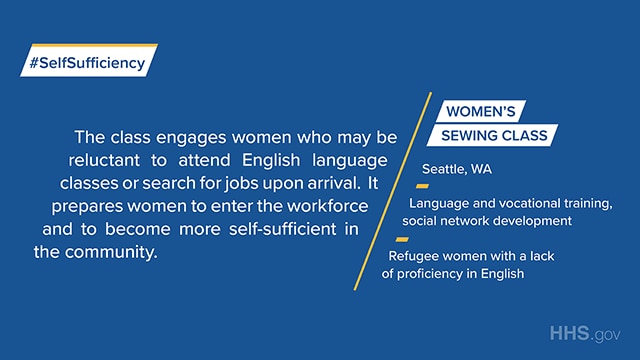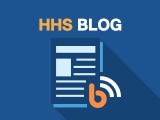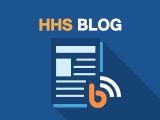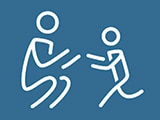Moving to the United States: Programs to Support Refugee Self-Sufficiency
Consistent with President Trump’s Executive Order on Reducing Poverty in America by Promoting Opportunity and Economic Mobility, HHS’s Strategic Plan sets goals for HHS to encourage self-sufficiency and personal responsibility, and eliminate barriers to economic opportunity. This blog is part of the Self-Sufficiency Series: Solutions from the Field, which profiles local programs from across the country finding solutions to accomplish these goals.
HHS’s Refugee Resettlement Program creates a foundation for new populations to achieve self-sufficiency in the United States a key goal of HHS and the President’s Executive Order on Reducing Poverty in America. Time-limited health coverage, cash assistance, employment services, and English language training help ease initial resettlement and the successful transition to life in America.
The Office of Refugee Resettlement’s (ORR) Voluntary Agencies Matching Grant Program provides intensive case management and employment services as an alternative to public cash assistance to help ORR-served populations achieve economic self-sufficiency within four to six months of arrival in the United States. The Matching Grant program defines economic self-sufficiency as earning a total family income at a level that enables the family to support itself without receipt of State-administered cash assistance. In practice, this means having earnings that exceed the income eligibility level for receipt of cash assistance in the state and the ability to cover the family living expenses. Families that achieve economic self-sufficiency may still be eligible to receive medical, housing, and food assistance.
Nine voluntary agencies, such as the World Relief Corporation of National Association of Evangelicals and the Hebrew Immigrant Aid Society, receive grants to operate Matching Grant programs and they are required to match the federal funding. In FY 2016, 67 percent of enrollees in such programs achieved economic self-sufficiency by day 120 and 84 percent by day 180.
One Matching Grant program helps refugee women overcome two common challenges: learning English and acquiring vocational skills. The Women’s Sewing Class at World Relief’s affiliate in Seattle engages women who may be reluctant to attend English language classes or search for jobs upon arrival and prepares women to enter the workforce and to become more self-sufficient in the community. The six-week course includes acculturation topics, vocational English language training, and sewing skills, while also providing socialization opportunities for women who are otherwise quite isolated.
Using privately funded sewing machines, participants create such sewing projects as pillows, oven mitts and small purses. And, in the spirit of passing it on, the women also have the opportunity to create baby blankets for future refugee families. The class is as much about the sewing as it is about other skills and community gained during the process. Volunteers and the community faith-based partner, Hillside Church, are critical components of the program’s success because they provide the infrastructure and personnel for the program to thrive.
“It’s incredible how transformative this class is for each student and volunteer… [E]veryone begins as strangers but they leave as friends. It goes beyond just gaining skills in sewing and English.” - Tahmina Martelly, resiliency programs manager.
As of early 2018, the program reports that it served 42 women since its inception in February 2017. Although none of the women envisioned working outside their home prior to the course, three participants now have full-time sewing-related jobs, six women sew part time for a local Seattle clothing collective, six women are in child care jobs, and others have enrolled in higher-level English classes after finishing the course. The class now even has a waiting list for enrollment.
“Every day, I come and I see my new friends and I learn to make many beautiful things.” – Mursal, a sewing class participant.
The Women’s Sewing Class is one of the many creative ways ORR Matching Grant programs are working to improve refugees’ transitions to life in the United States and their economic opportunities.

This is the 13th installment of Self-Sufficiency Series: Solutions from the Field -- Refugee Women’s Sewing Class
National Grateful Patient Day: Spreading Gratitude and Hope
Year in Review


